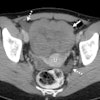Walter Reed Army Medical Center researchers report that the use of an ultrafast CT scanner eliminates the risks of adverse effects that children sometimes experience when sedated before diagnostic imaging procedures.
Children are sedated in order to calm them and eliminate movement, thus avoiding the need for repeated imaging. However, sedatives have caused difficulties ranging from mild respiratory depression to cardiopulmonary collapse in 1% to 5% of pediatric patients, according to a release from the American Roentgen Ray Society.
In a test on 20 patients ranging in age from three weeks to six years, an ultrafast CT scanner used in the study reportedly produced no ill effects, such as physical injury, reaction to contrast agents, or cardiorespiratory collapse, according to the release. The high-speed imaging also proved adequate on the first round, so scans did not need to be repeated or rescheduled.
The WRAMC researchers will present their results at the annual meeting of the ARRS, to be held May 7-12 in Washington, DC.
By AuntMinnie.com staff writersApril 27, 2000
Copyright © 2000 AuntMinnie.com
















